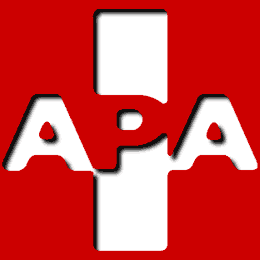Reports
2023-2025
VERSLAG 2023-2025
In the past period we have mainly focused on selling the building and the land, which was successful in March 2025.
Elly Godrie, Kadek Wira and Casey Godrie are now going to reconsider how to use the money, small-scale projects and possibly also a project, in which our manager, Kadek Wira, becomes the initiator within a business operation, in which he can transfer the skills to young people with a disability. Ideas, location etc. welcome.

Aid Projects Asia – Elly & Casey Godrie – Bali, Indonesia
2015-2022
2015-2022 REPORT
In our last report, 2010-2014, we reported the project of our education centre in Lovina closed mid 2012. Then we mentioned we decided change our focus, after evaluation of our short term targets and divers activities. In the end this meant, out of circumstances, almost nothing happened last years. We negotiated with some potential buyers but without succes. For this reason the former text of 2010-2014 is still actual.
The foundation is currently investigating the possibility of offering the space for use or for sale to other foundations or organizations working locally.
The space in the center in Lovina offers many possibilities, but a different location is being sought that better meets the current need. Initially, several activities and skills were offered in an orientation phase. This has shown that there is a need for a workshop or studio that is 'in the running', where young people with disabilities can gain practical experience and learn targeted skills. This offers a greater chance of an income and employment. The young people who took part in the workshops turned out to be unable to properly apply or capitalize on their learned skills after all. This is a process that requires a lot of guidance and, according to the foundation, it is better to take place in an environment of a workshop or studio.
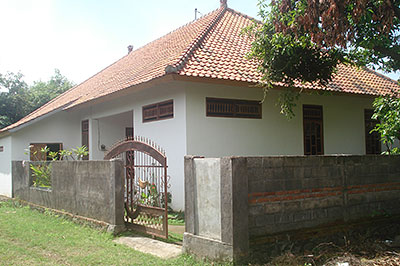
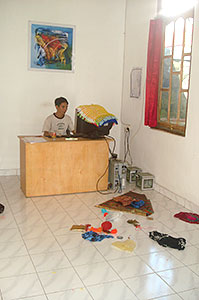
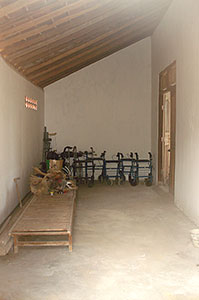
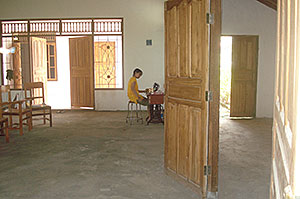
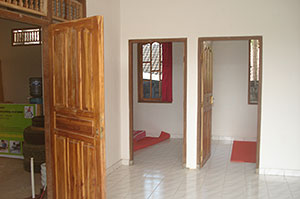
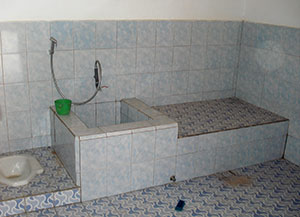
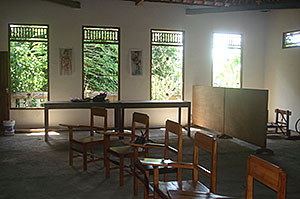
If you are interested in using or purchasing the building or part of the space, please contact the APA Foundation. If you are a foundation with an objective linked to ours, pricing is secondary. We will mark the part that has not been achieved as a donation. Above you will find photos of the center and the different areas.
2010-2014
2010-2014 REPORT
The project of the training center in Lovina was stopped in mid-2012. After evaluating the short-term goals and the various activities, it was decided to change course.
The space in the center in Lovina offers many possibilities, but a different location is being sought that better meets the current need. Initially, several activities and skills were offered in an orientation phase. This has shown that there is a need for a workshop or studio that is 'in the running', where young people with disabilities can gain practical experience and learn targeted skills. This offers a greater chance of an income and employment. The young people who took part in the workshops turned out to be unable to properly apply or capitalize on their learned skills after all. This is a process that requires a lot of guidance and, according to the foundation, it is better to take place in an environment of a workshop or studio.

Short report
In 2010 and 2011, various activities were organized and workshops were offered.
The foundation has taken several steps to make it possible for the young people to come. Initially, our motto was to ask the young people and their families for a commitment to the activities offered. For example, at the start they were asked whether the young people could be brought to the activities. This was possible for a few young people, but for others it was not possible to arrange their 'own' transport. In anticipation of this, the foundation purchased a small second-hand van in 2010. With this, everyone could now be picked up who otherwise had to stay at home. However, it later turned out that some young people were sometimes unable to come along because their family needed them for work at home to make an income. When this turned out to be an obstacle for a few, in order to be able to arrange it, the foundation proceeded to give the participants a financial contribution for their presence and participation. This was integrated into the curriculum as an advance on any sales of products that they would make and sell later. After all, it is an objective of the foundation to show young people how they could generate their own income by making articles themselves. In this way an attempt was made to show how they could apply new skills and the family was also supported and the young people were given the opportunity to continue to come.
For a long time there has been a fixed group of young people who regularly participated in the activities. Activities included basic math and learning how to read and write.
This turned out to be a challenge, as the project leader gave the lessons himself with assistance, but has no training in this. Nevertheless, a number of young people were enthusiastic and some certainly showed some progress, which is particularly impressive because they have never been able to go to school and had never been acquainted with the phenomenon of 'learning to read' or count.
Craftmanship skills were also offered. The aim has always been to learn how to make objects that could later be made and sold by the participants themselves with cheap means, such as making kites, photo frames, musical instruments, crocheted bags and hats.
During the workshops, a number of participants succeeded reasonably to well in learning the various actions and also performing them independently. A few needed a lot of guidance and aids due to limited motor skills.
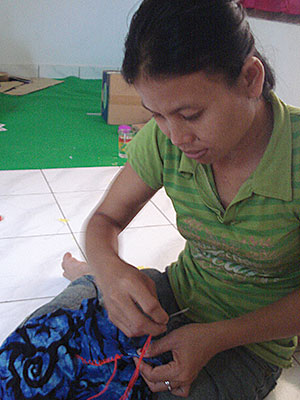
One girl has learned to crochet hats well and can also do this at home, although it remains important to guide and stimulate her in this. Workshops on baking cakes and making incense are also offered.
A number of times on Sundays, an outing to the beach of Lovina was organized, where the participants were picked up and where manufactured articles were offered for sale to tourists and other passers-by.
Circumstances that temporarily caused the group to fall apart
At the beginning of 2011, a participant died under very sad circumstances after a fall. This has been a blow to the group.
One participant was also kept at home with increasing regularity, with the stated reason that he had to help his father with the work at home. As a result, continuity has been somewhat compromised.
In addition, it has proven to be a challenge for the project leader to offer appropriate activities and workshops.


Evaluation
The evaluation showed that the diversity of activities that were offered had a positive effect on the participants. They were able to become acquainted with the learning of various skills. Some young people are now also able to make something independently or at least have gained ideas.
The fact that they had a daytime activity outside the home for a long time, were picked up and paid attention to, was also experienced as positive.
Changes can also be observed in the social field; By interacting with fellow sufferers, the young people have further developed by experiencing how each person deals with his or her limitations and possibilities. They were able to relate to each other and learn from each other.
However, it has become apparent that at home the young people do not manage to apply the skills they have learned in the sense of making the articles they have learned to make or to edit themselves.
There appears to be a need for targeted learning of skills that can be applied within a workplace, in an employment context.
It is not easy in Bali to place a young person with, for example, a limitation of hand motor skills, whether or not in combination with an intellectual disability, in a workshop in training. This requires guidance and an investment of time, while it is not clear in advance what this investment will yield the workshop owner. The foundation cannot therefore guarantee the guidance.
As a result, the plan arose for a foundation to look for one or more other locations in the form of a workshop or studio to be set up, where young people can gain work experience under their own supervision, under their own management.
Organizing workshops has therefore (temporarily) stopped.
In order for a workshop to run smoothly, it must be centrally located and easy to find for customers.
Because the foundation has limited resources, it has been decided to sell the large training center.
The center is a great space with many possibilities but too big and therefore too precious to leave unused. For the same reason, the van of the foundation was sold.
The Project Leader has temporarily found other work, but is still involved in the plans to start up a workshop and is actively looking for another destination for the training center.
The foundation is currently investigating the possibility of offering the space for use or for sale to other foundations or organizations working locally.




If you are interested in using or purchasing the building or part of the space, please contact the APA Foundation. If you are a foundation with an objective linked to ours, pricing is secondary. We will mark the part that has not been achieved as a donation. Above you will find photos of the center and the different areas.
2009
2009 REPORT
ACTIVITY CENTRE IN LOVINA OPENS
The training centre for young people with a physical and/or mental handicap really got going this year. The centre is in Lovina, in the north of Bali. Our local mediator, Kadek Wira set up the organisation, working with the founders of the foundation, who were in Bali in February, March and November and who also managed the project by e-mail. Marieke de Wit, founder and physiotherapist of Stichting high5Rehab, was also involved.
The start-up phase showed that it is best to begin with short-term targets that can gradually be upgraded to achieve long-term goals such as providing workshops and training courses. An example is offering activities during the week, focusing on teaching the young people skills that, after some practice, they can use immediately.
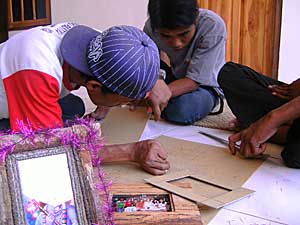
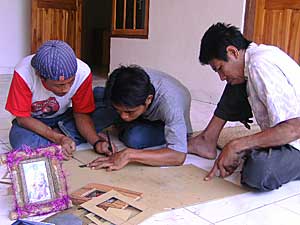
This approach should make it less demanding for young people and their families to attend the centre and it also allows a better assessment of how the program can best be adapted to their needs. As a result, specific workshops and courses have been postponed to a later date.
Problems during the start-up phase
In contrast to the indications from the preliminary studies, the start up phase showed that many handicapped young people found that attending the centre was in fact a huge step. The foundation’s target group is mainly young people from the poorest sections of the community. One of the commonest reasons given is that the family finds it difficult to make time to accompany their child or relation to and from the centre and often they do not have their own transport. In addition, many of the young people, who are 16 or older, and their families are not used to the approach that they actually have an ability to develop beyond helping out around the house. Many of them have never been able to go to school and are mainly used to being at home. Furthermore, some of them are dependent on others for everyday activities such as leaving the house. Sometimes, feelings of inferiority and helplessness create a degree of embarrassment, and there is a fear of the unknown. These young people and their families have not realised that, with some assistance and adaptations, they have very many opportunities.
In effect, travelling back and forth means a loss of time for earning money. Leaving transport to others is not to be an option for many; partly because of a fear of putting care into other hands or of what might happen to a family member. Consequently, if there is also uncertainty about whether this investment of time will actually deliver anything financially in future, the effect is that many families prefer not to get involved.
Activity centre and sheltered workshop
The following approach was, therefore, started as an experiment. The short-term aim is now that the centre will first become an activity centre and sheltered workshop. Young people who attend have the opportunity to learn practical skills through simple activities, which they themselves can apply directly in practice, if necessary with a little help. This will quickly give them the ability to use their skills at home or elsewhere or to work on orders at the centre as in a sheltered workshop. If they are interested, young people, with or without their families, may be eligible to set up a business, with a small amount of start-up capital and/or funding.
Young people who have never been to school can receive basic lessons in reading and writing and, if they are interested, in learning English.
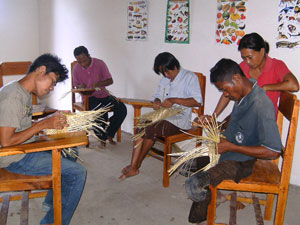
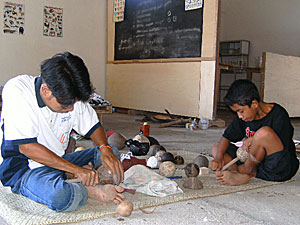
The original plan was to offer the young people free workshops and not to support them financially in the ‘training phase’. The idea behind this was for the young people and their parents to show a degree of commitment and effort and not to take things for granted. This has, however, changed temporarily since investing time when they are not earning is a problem for these poor families. Participation in the activities is now paid and they have the prospect of earning money by making a range of goods to order. The products they make or adapt are currently on sale in specially selected shops, such as High5Rehab’s store in Lovina, and will soon be offered for sale on the internet. It is also currently possible to pay an allowance for transport. The decision to offer payments at this stage is an encouragement to the families to give the young people this opportunity. The hope is that the example set by the first participants will attract others.
Activities
During the week, activities are organised offering skills increasing from simple to more complex. The young people are always welcomed with an emphasis on valuing and developing everyone’s abilities rather than looking at their limitations.
A skill is offered each time and sometimes developed over several sessions. An example is baking the special, coloured biscuits and cakes that are widely sold on Bali and used by the local people as sacrifices. They also learn how to make incense, which is used daily at home and in the temple.
These are examples of skills that the young people can use at home with some practice and financial support. Other examples are painting wooden objects and making musical instruments from natural materials, such as coconut and wood, which can be sold direct and/or through shops.
Other examples are painting wooden objects and making musical instruments from natural materials, such as coconut and wood, which can be sold direct and/or through shops. Some of the activities are offered by the mediator. Sometimes, a ‘guru’ (teacher) is brought in specifically for example, for making baskets and woven bamboo objects.
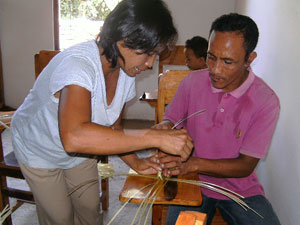
A sewing teacher is currently being sought. Eventually, this will allow items to be made to order or a sewing workshop to be set up. The young people with a handicap see this as an ambitious plan as often their experience in practice is that there is great competition from non-handicapped people. The challenge is to find a way in which handicapped young people can help themselves and earn their own income. In an earlier project, APA donated a sewing machine to a girl who could then start work without excessive costs.
As noted, the young people can follow reading, writing and English lessons.
Plans for the near future
Consideration is being given to setting up a real workshop where a group of young people can work on orders and so be sure of a steady income. Young people who work at home could also take part in this project. Ideas include hand-made wooden or leather goods and jewellery, clothes and bags for sale in shops and/or a webshop.
There is also an investigation of whether a cooking and baking team can be set up by students who could earn an income by selling snacks and food for example, in an eatery or mobile sales point (street food stalls are a familiar sight in Indonesia).
FINANCIAL REPORT
All projects which do not yet have a sponsor are funded by APA Foundation. Out-of-pocket expenses for local activities, such as travel, telephone, accommodation, etc., are paid by the staff of the foundation themselves so that the funds of APA Foundation are not drawn on and all the funds can be spent on the projects. The same applies to expenses incurred for activities in the Netherlands. We have been fortunate in being able to rely on loyal supporters, including the webmaster and the translator, for many years. To date, any costs for website construction and maintenance, printing, etc. have been borne by Bebob Design, Amsterdam.
2008
2008 REPORT
In February, staff of Stichting APA returned to Bali to review progress and the implementation of projects and to inaugurate and supervise construction of the training centre in Lovina. In Bali they received the sad news that the foundation’s regular contractor, Komang Agung, had died at the age of 35 as a result of serious injuries a day after a bad fall from his moped. We were deeply shocked by this news and offer our condolences to his family. Komang was the contractor who had carried out a number of our projects. It was a great pleasure to work with him since as well as being skilled, he was always loyal and reliable. We will miss him as a person and as an employee of the foundation. We wish his family well.
Arrangements had been made with Komang Agung on the construction of the training centre in Lovina. Building work will probably not now be able to start on the planned date. Other arrangements also had to be made for the projects that Komang was working on.
COMPLETION OF HOUSING MODIFICATION PROJECTS
Last year Komang Agung started preparatory work for the construction of an adapted kamar mandi (bathroom and toilet) for Made Sujaya and modifications to a kamar mandi for Wayan SumiasiHe was unable to complete these projects. Both of these young people were proposed for assistance by Stichting Senang Hati and live near Tampaksiring.
Made Sujaya is 21 years old and living temporarily at Senang Hati where he takes part in workshops and receives physiotherapy. He can only walk with great difficulty, using crutches, and also uses a wheelchair. His parents are very poor and there is no toilet or bathroom at home (see IB 260307 Made).
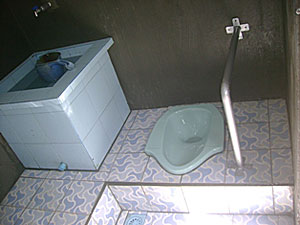
Wayan Sumiasi is 16 years old, relies entirely on her wheelchair and has limited hand and arm function. Consequently, she depends on members of her family for care. The family can use a bathroom and toilet at the back of their property, but it is in very poor condition and totally unsuitable for Wayan and her carers (see IB 260307 Wayan Sumiasi).
A contractor who works for Senang Hati is prepared to complete the projects for Made and Komang but the costs are higher than planned as the family used the building materials which had been delivered elsewhere around the house. Both projects were completed in June 2008.
SEPTEMBER 2008
THE TRAINING CENTRE
The aim
As described in the 2007 report, last year APA Foundation purchased a plot of land in Banyualit, Lovina, for a training centre where young people with a handicap will be able to take part in workshops and training courses. If they wish, they can also be assisted in finding work and/or setting up a business which will allow them to earn an income of their own.
Where possible, assistants and teachers will be appointed who themselves have a physical handicap and who, therefore, have their own experience in this area. This will show the young people that a handicap need not be an insurmountable obstacle and they learn to focus on their abilities instead of their disabilities.
The aim is that the centre will eventually become largely self-supporting. Its income will not be from course fees or contributions from the trainees or participants in activities, but from selling goods made at the centre through its own sales outlet. Opportunities for producing goods to order for customers will also be investigated but this is a long-term aim.
The site / location
The centre is being built in Banyualit, in Lovina, and is alongside Stichting High 5 Rehab’s complex. The location allows different types of co-operation. In general, Stichting High5Rehab mainly looks after younger children with a mental or physical handicap while APA Foundation focuses on children and young adults. Children can be referred from one foundation to the other. The training centre will offer the children opportunities for occupational therapy in addition to the therapy package and education at High5Rehab. Young people from 16 years of age can attend workshops and training courses to prepare them for joining the labour market. Lovina is on the coast a few kilometres from Singaraja, the capital of northern Bali, which has a key position in the area. Until recently it attracted many tourists and still has all kinds of tourism facilities. Tourists offer a market for items made specifically for them at the training centre.
Construction plans
After careful consideration and preparation, comparison of bids and drawing up a plan, building work started on 23 March 2008. Kadek Wira, who has been a mediator for the foundation for many years, was appointed as overall project manager in April and became the first official salaried employee. The building plans were prepared with the assistance of Eric Jansen, who has a lot of experience in this area, in particular through his involvement in the reconstruction of the accommodation of the Indonesian Senang Hati foundation, for and by young people with a handicap. All of the building workers come from the region, meeting a specific wish of the village leader on work creation for local people. Marieke de Wit of Stichting High5Rehab will be involved when the training centre opens and will supervise the therapy activities in particular.
The building
The building has been designed so that in addition to the office, there is a wheelchair-accessible sanitary area, a second toilet/washroom, two residential studies and a large workshop and study area that can be set up as required using mobile panels, making the space very flexible. There are large unglazed windows on one side, fitted with grilles to allow the air to circulate. This makes for safe working conditions given the different materials that will be handled. The space can be screened off against wind and rain using bamboo blinds. There is also a storage space for materials and stocks. The entire area is wheelchair accessible and suitable for use by people with a handicap. There are sufficient parking spaces and the area around training centre is fully wheelchair accessible where the land allows.
Building work
Fortunately, work is progressing well and, at the end of October 2008, the training centre only needs to be finished off. Before the building work could begin, the site had to be levelled and cleared; fortunately one mango tree was left in place. The construction of building makes allowance for the earth tremors that sometimes occur on Bali.
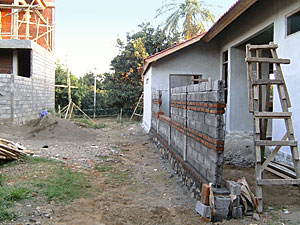
The plans had to be revised slightly during the building work, for example, for a reduction in the space around the building in order to meet the requirements for distance from the public road.
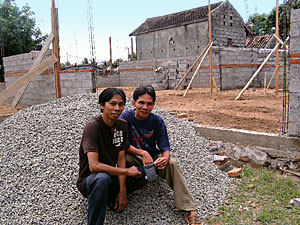
Inflation has increased to cost of building materials and so the budget has been exceeded but the foundation has decided to maintain the quality standards that the building had to meet. The foundation is calling on sponsors to deal with the financial consequences (for more information see the ‘sponsors’ section in this report and the project page). One of the staff from the Netherlands made a working visit in November to supervise the finishing of the building with the project manager.
NOVEMBER 2008
The project is going ahead
The building was almost complete by November. One of the founders of APA Foundation visited Bali to manage this key phase, checking that the building meets all the requirements and making sure that the water and telephone connections are made. The first office equipment, including a desk, office chair and filing cabinet, have now been purchased. Tools, equipment and materials will be bought when the exact final shape of the project is known.
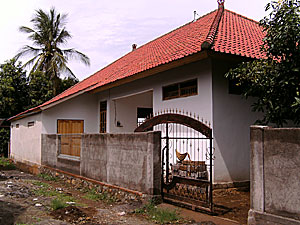
Details of the project are being worked out in consultation with Kadek Wira and Marieke de Wit. The workshops, training courses and teaching programmes to be offered have been identified, with the focus on the needs and demands of young people with a handicap. Young people from the age of 16 are the target group, and the ultimate aim is that they can sell goods that they have made themselves.
To begin with, the focus will be on developing and teaching skills that the young people will be able to benefit from immediately. A good example is an English course for all participants. Being able to speak English not only means more opportunities in the labour market, especially in the tourism sector, but also more respect in the community. This can considerably enhance the young people’s feeling of self-esteem.
An extra benefit is that parents immediately see the value of letting their handicapped child attend the centre: after all the child has learnt to speak English! Experience shows that parents see taking and collecting their children to the centre as an investment in the future. If there is no clear and quick improvement in their child’s situation, parents are likely to keep the child at home and concentrate on improving future opportunities for their healthy children. A clear result encourages parents to bring the child to the centre to develop further.
Courses will also be given on making everyday items such as the woven palm and banana leaf boxes and baskets used in ceremonies and for making offerings in temples or at home. Another example, is baking cakes and other snacks. The main reason for teaching this type of skill first is that these articles can be sold on the street or in a shop, becoming an immediate source of income.
As well as the courses, there will be painting, sewing and woodworking workshops, focusing on products attractive to tourists (starting with simple items that can sell well to tourists and in Europe). Eventually, the young people will be able to pass their skills on to others.
The composition of the groups, transport of future students and the salaries of the teaching staff were also discussed with participation from High5Rehab. Suitable teachers (with a handicap) are currently being sought. Contacts of APA Foundation who have the necessary skills and experience, including Komang Putra (see the 2002B 230402 report) and Gede Sedana (see 2007 B 110407), have been approached. Teaching staff will initially be paid by the hour.
Each day the lessons will include a moment of positive reflection on the abilities of each participant.
The project is expected to start on 1 February 2009.
SPONSORS
As noted above, the budget for the construction of the training centre has been exceeded because of the unexpected increases in labour costs and the price of building materials. To prevent the opening of the training centre having to be postponed for lack of funds, APA Foundation is looking for sponsors who would like to assist with the construction costs. Your contribution would be very welcome and allow the foundation to use the money to get the project up and running quickly and secure its future. There is information on the 2008 project page.
FINANCIAL REPORT
All projects which do not yet have a sponsor are funded by APA Foundation. Out-of-pocket expenses for local activities such as travel, telephone, accommodation, etc. are paid by the staff of the foundation themselves so that the funds of APA Foundation are not drawn on and all the funds can be spent on the projects. The same applies to expenses incurred for activities in the Netherlands. We have been fortunate in being able to rely on loyal supporters, including the webmaster and the translator, for many years. To date, any costs for website construction and maintenance, printing, etc. have been borne by Bebob Design, Amsterdam.
2007
2007 REPORT
APA Foundation
In March and April this year, the founders of APA Foundation visited Bali to evaluate current projects and start up new activities. During the visit, progress on ongoing projects was reviewed and new projects were started. An important item of news is the purchase of a plot of land in Banyualit, Lovina, where there are plans for a training centre and workplace where handicapped young people will be able to follow vocational training courses and gain skills so that they can earn their own income in the future. This long-term project will be possible thanks to co-operation with Marieke de Wit of Stitching High5rehab (www.high5rehab.org). This will achieve a long-standing ambition of the founders of APA Foundation.
The activities of APA Foundation to date are set out below. This year, the short-term projects will focus on housing modifications; adapting the homes of some young people more closely with their abilities and limitations. The aim is to make day-to-day care easier, either for themselves or for their carers. Examples are improving access to the house and outbuildings or the construction or modification of a ‘kamar mandi’ (combined bathroom and toilet). Housing modifications are made for children introduced by Marieke de Wit, physiotherapist and co-founder of Stichting High5rehab, Lovina, and for young people introduced to APA Foundation by Stichting Senang Hati, Tampaksiring. All housing modification work is supervised by Bapak Agung, the contractor who has carried out projects for APA Foundation in the past.
SHORT-TERM PROJECTS
Housing modifications
Gede Bona is a 9-year-old boy with multiple handicaps, who can usually be found in or around the house. He has a wheelchair, but cannot manoeuvre it by himself. Last year, the plan was to make the small house and veranda accessible for the wheelchair. Circumstances prevented this but the family arranged for the work to be carried out. The veranda has also been given a roof and so there is more living space. There was no money over to modify the bathroom. APA Foundation made the bathroom wheelchair-accessible and adapted the interior to make it safer and easier to use.
Lotu Artini (14) has serious multiple handicaps. She spends much of the day lying down or sitting in a wheelchair. She is completely dependent on her family for care. She cannot sit up on her own without support, partly because she has no headrest. APA Foundation is looking for a suitable chair. In the meantime, a headrest has been attached to her current chair to make it more comfortable. The kamar mandi (bathroom and toilet) is at the back of the property. This building is not accessible for the wheelchair and the family has no money to improve matters and so Lotu always has to be carried to the toilet by her family. Lotu’s day-to-day care is clearly a heavy burden for the family. APA Foundation has made the kamar mandi wheelchair-accessible and taken steps to make caring for Lotu easier. Access to the property from the street has also been improved.
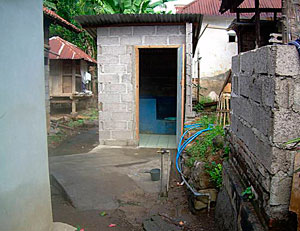
Made Sujaya is a young man of 20 who, since an illness when he was 13,e can barely walk. No diagnosis has ever been made, but his entire motor function is damaged and he also has difficulty speaking. He goes to Stichting Senang Hati for physiotherapy and to take part in workshops. The Stichting has also provided him with a wheelchair. Made actually lives with his parents but for the time being he can stay at the Senang Hati centre. His parents are very poor and live in a small house with no toilet or bathroom, which makes it difficult for Made to wash and go to the toilet on his own. He is always dependent on others for help, which is difficult for a young man… APA Foundation, therefore, drew up a plan to build a bathroom and toilet suitable to Made’s abilities, so that he can operate independently. This needs both a water supply and sewer to be built.
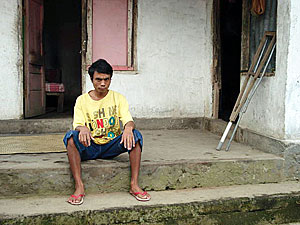
Wayan Sumiasi is 15-year-old girl. She relies entirely on her wheelchair and has limited hand and arm function and so she is dependent on care from members of the family. Wayan’s immediate family live with other relatives on a piece of land, and the old kamar mandi (bathroom and toilet) is on a mound about 100 metres at the back of the property. The bathroom is small, in dreadful condition and has a narrow doorway which makes it impossible to use from a wheelchair. It is increasingly difficult for her parents to lift and care for Wayan, who is now a fully-grown teenager. After discussion, it was decided to enlarge the bathroom and relocate and widen the doorway so that Wayan can enter with the wheelchair. The interior is being modernised and made suitable for her care. Outside, a gentle slope makes the kamar mandi wheelchair-accessible and the path across the property to the bathroom has been levelled and hardened so that the wheelchair can be moved more easily.
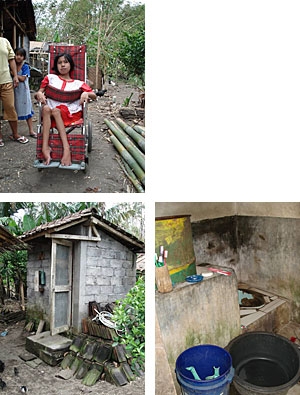
Putu Merta is 9 and lives with his parents and sister in Seririt, east of Lovina. He was introduced by Stitching High rehab (which has provided him with a wheelchair). Putu has a progressive muscular disease (Duchenne). Although he can crawl in and around the house, he is in fact completely dependent on the wheelchair. At the moment he can still wash himself but he needs help for other care, such as going to the toilet.
The family live with others on a property but there is no bathroom or toilet. Water for cooking and washing is brought in. There is no nearby water main that can be connected to nor can one be laid. In addition, it is not possible to make a connection to an existing sewer and so it was decided after discussions that APA Foundation would build a bathroom with a ‘mandibak’ (water reservoir) that the family can fill with water in the normal way and a wc with a large septic tank.
The plan was carried out by Agung, APA Foundation’s regular contactor once a suitable location had been found for the bathroom using the site of the temple on the property.
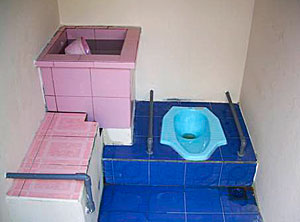
Tools
APA Foundation has been working in the same places for so long that requests for assistance are now being received from local people, such as Gede Sedane and his wife Ketut Supariati and their two children 2. Both parents have been handicapped since birth. Ketut can move using crutches. Gede cannot walk but can crawl quickly, with rubber kneepads. In the past, Gede used a wheelchair but can no longer do this, partly because of the poor state of the roads near his isolated house. When necessary, he can get a lift on a neighbour’s moped in exchange for doing odd jobs. Gede is a shoemaker who can make sandals, and a carpenter. If he has tools and materials, he can work at home or on site. A temporary customer makes them available to Gede but this means he is always dependent on orders for a fairly regular income. He could earn more if he had proper tools and sufficient materials available. Gede really wants a good drill so he could make items like bird boxes and baskets for the local market from materials he finds. APA Foundation has given him a Bosch electric drill and accessories and the materials to make a stock of sandals. APA Foundation’s new workshop and training centre will also assist Gede: he will be able to learn new skills and also teach others as a skilled expert.
Co-ordination of home modifications
Local work is co-ordinated from the Netherlands with the assistance of a local mediator, Kadek Wira. Drawings and pricing are organised during the visit of our staff to Bali. The work will be carried out under the supervision of Bapak Agung. The results will be seen on website in due course.
Dika
Sadly, Dika died on 13 August this year. APA Foundation volunteers came into contact with Dika and his brother Ogi in 2005 through Stichting High5rehab. In 2006, the foundation sponsored the construction of an adapted bathroom for them. We will remember Dika as a friendly boy with much artistic talent. APA Foundation wishes his parents and brother well.
PROGRESS EXISTING PROJECTS
Sewing machines
Once again this year, APA Foundation visited the home attached to the school (SLB) for handicapped children in Klungkung. It is wonderful to see that the playground set up some years ago is still well used. Fortunately, other donors and aid organisations have discovered the home and one result has been the gift of a new slide.
The head of the school has submitted a request for new sewing machines and it is being considered. Five sewing machines are currently available but they are in a poor state of repair. Before a decision is made, the head of the home will check how far these machines can still be used and the cost of repairing them. To be continued.
The retail project
Tourism has not yet recovered on Bali: many local businesses are suffering from poor sales of souvenirs, etc. This also explains the low level of sales of products in the retail project. APA Foundation is very grateful to Ibu Made, owner of the Sari Mekar shop, for continuing to keep the showcase of items made by handicapped children and young people in her shop.
We expect that the construction of the workshop and training centre will help the retail project as production and supply will be more in line with demand.
NEW LONG-TERM PROJECT
Training centre and workshop in Banyualit
In June, APA Foundation purchased a plot of land for a training centre and workshop for young people with a handicap. The land is alongside the Stichting High5rehab clinic. The aim is to put young people in a position to earn their own income, first by following a training course and then employment, if necessary in an adapted working environment. APA Foundation was set up to support and assist young people with a handicap, so that they have the opportunity to explore their abilities and make their dreams come true. Such a plan can only succeed, however, if continuity can be guaranteed and the fact that the Dutch volunteers of APA Foundation are only on site for a couple of months a year was an insurmountable obstacle. After years of co-operation and many discussions with Marieke de Wit of Stichting High5rehab there suddenly seemed to be a realistic possibility in early 2007 to start such a project. High5rehab had purchased some adjoining land to expand the clinic with an instrument workshop and a room where the children could learn a range of skills during their therapy or after treatment. This met the need identified by APA Foundation for a work and training centre for young people with a handicap. Marieke de Wit is prepared to take on the supervision of such a centre provided it is next to the facilities of Stichting High5rehab. Co-operation between the two foundations means that children could move from one social workshop to the other as their age and capabilities allow.
The plan is that young people can learn a range of skills and follow vocational training at the centre. They will also be offered basic skills so that they can then move to training courses with other aid organisations or normal education. To start with, carpentry and sewing workshops will be set up where apart from mastering manual skills, the emphasis will be on other relevant practical experience and know-how, so that they are prepared to take part successfully in paid work. In other words, they develop a feeling for products they can best offer on the market and how to manage an income. The range of subjects will be expanded at a later stage to include computer courses and art, for example painting. In the longer-term, consideration will be given to building a larger carpentry shop in a suitable location where handicapped people could be employed and where real manufacturing could take place, so that they learn how to run a self-supporting business. APA Foundation of course promises in every case to operate responsibly with a view to the environment and health and fair working conditions.
Requests are already being received from organisations and small businesses who want to place orders with the workshop in the future. These are very welcome as demand for specific products will shape the planning of the courses to be offered and the layout and use of space.
The plan is also to build units at the training centre where young people can stay or live for various periods. This will allow young people who live some distance away to follow a training course or suchlike. In consultation, these units could also be used, for example by families visiting Stichting High5rehab with their children.
Other organizations
Once again APA Foundation has made new and inspiring contacts with other organizations. A couple of examples: firstly, Anak Pertiwi’ (www.anakpertiwi.org) which helps and houses orphans in the widest sense. Its aim is to allow children to grow, participate and integrate in the community. It is currently building a home in Kintamani. Paula and Ketut, a married couple, are the founders and we thank them for their invaluable assistance in APA Foundation’s purchase of the land.
Bali Bundar (www.balibundar.orgis a Dutch organization focusing increasingly on assisting handicapped people on Bali. It supports initiatives of YPAC, Jimbaran. which supports young people with a handicap by offering vocational training, physiotherapy and treatment by a work therapist. It has a carpentry shop where young people with a handicap make furniture and other wooden goods to order and much of the work is self-supporting. Employees of APA Foundation made an exploratory working visit and opportunities for working with YPAC in the future are being examined.
ACTIVITIES OUTSIDE ASIA
Increasingly, requests for assistance are being received from countries outside Asia. Although such requests are outside the foundation’s target group, every application is examined to see how far it can be honoured. One example is the provision of a walking-frame to a little girl of 4 in Eritrea, which APA Foundation was able to supply.
Hand-made items were sold during a small-scale try-out at a hippy-market in the'Ganpati' beach pavilion in the dunes by the beach south of Zandvoort on 23 September and the proceeds went to APA Foundation. The stand was provided free-of-charge by Ganpati, who receive our thanks!
FINANCIAL REPORT
All projects which do not yet have a sponsor are funded by APA Foundation. Out-of-pocket expenses for local activities such as travel, telephone, accommodation, etc. are paid by the staff of the foundation themselves so that the funds of APA Foundation are not drawn on and all the funds can be spent on the projects. The same applies to expenses incurred for activities in the Netherlands. A loyal group of people, including the website manager and the translator, also offer support. To date, any costs for website construction and maintenance, printing, etc. have been borne by Bebob Design B.V.
We would like to take this opportunity to thank everyone!
2006
2006 REPORT
APA Foundation continued to assist young handicapped people in Asia in 2006. New projects have been started and some of them have been completed. We report on certain activities below.
In the spring, in March and April, there was a visit to Bali to set up new types of support and assistance and to ensure progress on various projects. This year, new projects focused on ‘housing modifications’. The home situation of a number of children was examined and then plans were drawn up for modifications based on their abilities and limitations. The modifications make care by those directly involved, such as family members, easier and enhance the children’s degree of independent action. As a result of their greater ability to look after themselves, the children’s dependence on the availability of care by others declines. Most of the housing modifications have been made for children introduced by Marieke de Wit, physiotherapist of Stichting High5Rehab, Lovina.
INDIVIDUAL PROJECTS
Housing modifications
The new and adapted bathroom in the new house of brothers Ogi en Dika was completed early this year (see also IB 250405 Dika & Ogi). The toilet could not, however, be used as intended and after examination was modified in line with the brothers’ current abilities.
Komang Sukarini's house was also modified. A plan was drawn up in consultation with her parents to make the bathroom/toilet (kamar mandi), which is in the garden, accessible from the house.
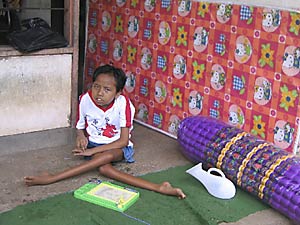
Sukarini has multiple handicaps and cannot move independently. Consequently, she depends on others for day-to-day personal care. In the past, she was carried to and from the kamar mandi by one of her parents, but Sukarini is now 12 years old and is too heavy for her mother. The modifications were made by her father and a local builder. Sukarini can now be taken to the kamar mandi in a wheelchair. She has also received a new mattress to sleep on and one to rest on during the day (See IB 200406 Sukarini)
Another example of housing adaptation was for Wayan Sudiana. APA Foundation was put into contact with Wayan by Senang Hati Foundation, where Wayan receives physiotherapy. Wayan is 15 years old and has multiple handicaps. He is able to move by shuffling or crawling across the floor or by using a wheelchair, even though it is slow work because of his spasms. Wayan lives alone with his father, who is a ‘day labourer’, meaning that he has to find work and an income each day.
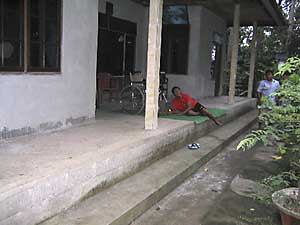
As a result, Wayan is on his own for several hours a day. The house was built in the traditional style with two steps all round to avoid flooding. This means in practice that Wayan cannot easily leave or enter the house, and it is even impossible to leave independently in a wheelchair. As there is no bathroom/toilet (kamar mandi) in or near the house, father and son use the river in a ditch some distance from the house. Wayan’s father carries him on his back. Wayan is growing, however, and carrying him will be an increasing burden for his father and other carers. His father does not, however, have the money to build a bathroom/toilet. It is, therefore, difficult (and embarrassing) for Wayan to use the toilet during the day, especially if his father is not present. In consultation with the father, APA Foundation has drawn up a plan for housing modifications, which includes the construction of an adapted kamar mandi. A builder, supervised by Senang Hati Foundation, has carried out the housing modifications. A ramp makes the house and the kamar mandi accessible by wheelchair. In addition, Wayan can now also go into the garden on his own (See IB 190306 Wayan Sudiana).
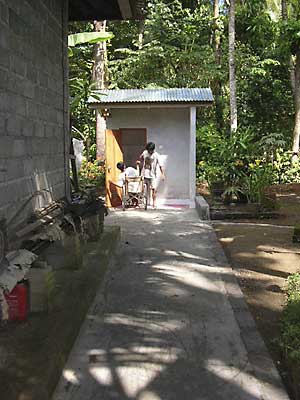
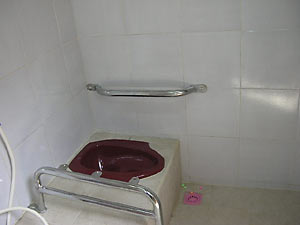
A housing modification project was also proposed for Gede Bona (8) and Putu Artini (13), both of whom have multiple handicaps. The work was discussed by direct staff of APA Foundation and carried out after they had left. In the intervening period all received a small toilet facility (urinal) so that they are less dependent when going or being carried to the toilet.
Ilu is an 11-year-old girl with multiple handicaps. She has remained small as a result of a congenital defect and depends entirely on others for care. As she is small and very light, carrying Ilu is not a physical burden for the carers. Ilu cannot sit independently and, therefore, always has to be carried or moved in a very old, worn-out pushchair. She spends most of the day lying on a mat or a bed at home. Although the family is very poor, the only request they made for a contribution to care was for the purchase of nappies (diapers). APA Foundation met this request and also made available a new pushchair and a comfortable mattress (see IB 200406 Ilu).
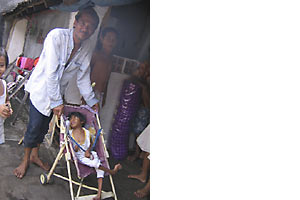
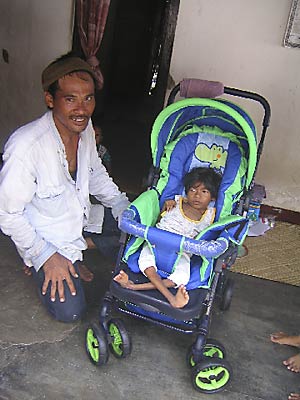
Printing T-shirts
This year, APA Foundation asked Olis to print t-shirts. Olis is deaf and associated with Senang Hati Foundation where he has learnt to print textiles. He passes on this skill during workshops for other young people with a handicap who can earn their own income with their skills. The t-shirts are ordered from and made by a small family business so that the money spent by the foundation benefits the people of Bali.
The t-shirts are printed with one of the cartoons drawn specially for APA Foundation by Hans Mader in 2003. Mr Mader made them available to the foundation for it to use in meeting its aims. The printed t-shirts will be given to young people with a handicap but also, for example, to disadvantaged young people such as street children. The chosen design is black and red on a white t-shirt with red edging. Olis has delivered good work. The result is a cheerful t-shirt.
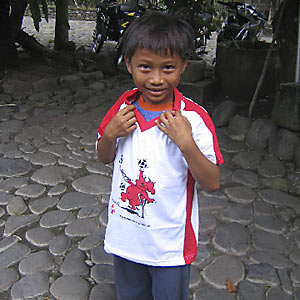
Young people who were assisted during 2006 also received a t-shirt from the foundation, as did street children contacted "in the street".
PROGRESS EXISTING PROJECTS
Playground
As usual, this year staff of the foundation visited the school in Klungkung and the home linked to it for children with a handicap. An inspection showed that the playground which had been built by APA Foundation, needed maintenance.
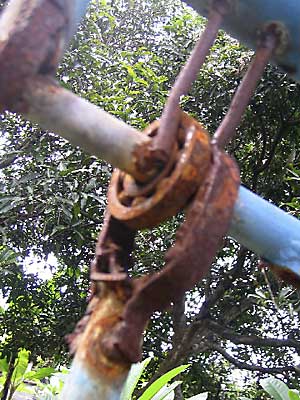
There was some wear and tear as a result of the weather and intensive use. The maintenance was carried out immediately.
Retail project
The retail project that started last year is still running but there is little retail activity in general because of the economic downturn on Bali, partly because of the fall in tourism. This also affected the project. Some items have been sold, but fewer than expected. The project needs to be re-examined and given a new boost. In any event Arini, one of the participants, is able to offer the hats she crochets for sale via the project. APA Foundation is grateful to Ibu Made of the Sari Mekar shop for her assistance.
'The meal project'
The meal project in the Semina restaurant was unfortunately stopped after a short while when the owner of the restaurant decided to cancel the agreement. This was all the more unfortunate as the project was going well and had collected Rp. 589,150 in only a few weeks. APA Foundation still believes that the project has succeeded to a significant extent as it was a pilot project that showed that the ‘formula’ works.
ACTIVITIES IN INDONESIA
It is quite normal when you do assistance work that you make contact with other helpers and organisations (including Impian Saya Foundation and Kupu-Kupu Foundation). In a number of cases this has led to exploring new forms of co-operation including opportunities for mutual support. An example is that APA Foundation is mediating in finding donors for projects of other organisations including Impian Saya foundation. , which is looking for financial support for Indrayani, a girl who will finish secondary school this year as one of the best pupils and who wants to train as a midwife, but her family does not have the financial resources for this.
As noted last year, APA Foundation has investigated setting up a separate section to allow disadvantaged children to go to school. This not only covers children with a handicap, but disadvantaged children in general. APA Foundation has not yet set up a fund to sponsor school children but has contacted Impian Saya Foundation, which already has a fund for underprivileged girls who want to go to school. Discussions with the Foundation show that sponsorship of schoolchildren requires a constant cash flow to ensure children can stay at school until the final year. This involves considerable sums by Balinese standards and these are high largely because of transport to and from school. APA Foundation intends to set up a cost-saving approach for example, by arranging cheaper means of transport. (As an experiment, however, staff of the foundation have privately sponsored the sister of one of the mediators of APA Foundation.)
We still also have good contacts and co-operation with High5 Rehab foundation and Senang Hati foundation.
ACTIVITIES IN THE NETHERLANDS
Since 1998, APA Foundation has mediated in the annual donation to the Liliane Fonds by Bebob Design B.V. Amsterdam, from sales of GISO Lighting. Part of this turnover goes, after discussion with Bebob Design and GISO B.V. , to a regular mediator, Zuster Merlit , and young handicapped people in need near Delhi, India. (See also NL1998 APA-Liliane Fonds-Bebob Design B.V.)
Co-ordination of home modifications
Local work is co-ordinated from the Netherlands with the assistance of a mediator, Kadek Wira . Drawings were made during the visit of our staff to Bali. The work will be carried out under the supervision of Bp. Agung. The result will be seen on site in due course.
FINANCIAL REPORT
All projects which do not yet have a sponsor are funded by APA Foundation. Out-of-pocket expenses for local activities such as travel, telephone, accommodation, etc. are paid by the staff of the foundation themselves so that the funds of APA Foundation are not drawn on and all the funds can be spent on the projects. The same applies to expenses incurred for activities in the Netherlands. A loyal group of people, including the website manager and the translator, also offer support. To date, any costs for website construction and maintenance, printing, etc. have been borne by Bebob Design B.V.
We would like to take this opportunity to thank everyone!
2005
2005 REPORT
This year’s report starts with an impression of the foundation’s activities during the working visit to Indonesia in the period from mid-February to early May. During the visit, new long-term projects started, a number of individual requests were organised and new co-operative alliances began and there was also an investigation of new aid projects under the umbrella of APA Foundation but not aimed specifically at young people with a handicap. These are helping street children and the creation of a study fund for disadvantaged young people in Asia in general.
NEW ALLIANCES
Stichting High 5 Rehab
Many new contacts have been made and alliances entered into. One example is the contact with Marieke de Wita Dutch physiotherapist who has been working in northern Bali for eighteen months with her own foundation, High 5 Rehab. Ms de Wit and her husband have set up a small centre where they treat and supervise handicapped children completely without charge. As well as physiotherapy, they offer other activities to enhance ADL (day-to-day living) independence and functioning in general. (See www.high5rehab.org)
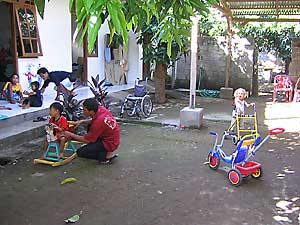
Marieke de Wit Working with APA Foundation, Marieke de Wit has examined a number of children and young people and made recommendations on treatment and provision of suitable aids.
Senang Hati foundation
A new project for APA Foundation is setting up outlets selling items made by young people with a handicap and the Senang Hati foundation was visited in connection with this. (See Long-term projects.) Senang Hati was set up with the help of Yantin, contact for the Liliane Fonds and seconded by VSO Netherlands, but is run by young people with a handicap. Senang Hati's aim is the integration of handicapped people in society. It does this in part by organising free workshops and courses for handicapped people by handicapped people at the centre. (A small contribution is requested if someone wants to stay at the centre for any length of time.)
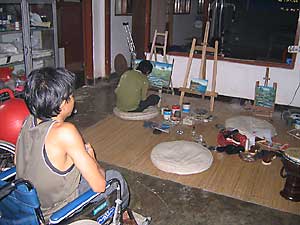
The aim of these activities is for these young people to master skills and so have a better chance of finding work or moving on to a course elsewhere. They take part with great involvement and enthusiasm. It also sells items made by young people with a handicap through its own gallery and retail points all over Bali. The way sales to third parties are organised needs more attention as Senang Hati's selling prices to retailers and customers are currently too far out of line and the price difference benefits the middlemen and not Senang Hati. This will be part of the co-operation with APA Foundation. Senang Hati is also able to print t-shirts. APA Foundation plans to place an order in the future using the Hans Mader cartoons (see 2003: cartoons)
Toko Sari Mekar and Resaurant Semina
APA Foundation is being assisted with two new long-term projects by ibu Made Witari of Toko Sari Mekar and the owner of the Semina Restaurant, both in Lovina, both of whom are lending a hand without any financial reward.
APA Foundation had to relocate its goods storage and Ibu Made and her family have made space available at a favourable price, for which we are grateful.
Alliance with a contractor
for housing modification
The Foundation has been pleased to work with Bp. Komang Agung, contractors as part of modifying Jojon's housing (see 2005: Jojon). The intention is that other projects will be managed by this contractor in the future. If the staff of APA Foundation are not on site to discuss the work with the contractor, the mediator will do the honours.
Contacts with other aid providers
New contacts have been formed with other organisations and aid bodies including a married couple from Australia who supply rehabilitation aids to various organisations and who have said they will work with APA Foundation. One item being examined is whether they can develop a prototype portable shower and commode in Australia which can be manufactured in Indonesia.
LONG TERM PROJECTS
Retail project
One of the long-term projects set up this year was the 'retail project' using the shop-in-shop concept. This creates retail outlets, without having to set up a complete shop, where young people with a handicap can offer items they have made for sale. The retail outlet may be in a shop or perhaps a hotel or restaurant. For the try-out, ibu Made Witari and her husband were prepared to set up a display of these items in their shop free of charge. Ibu Made is an old friend of the foundation who in the past has introduced applicants for assistance, in particular her neighbour, Ketut Kartawa, and Komang and Arini who live in the area. The shop is on the main road from Singaraja to Seririt and attracts tourists with colourful traditional articles such as decorations for domestic shrines and ceremonies.
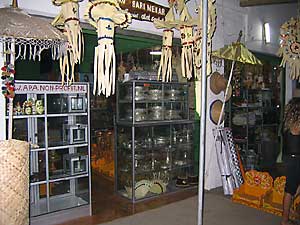
The customers also include local people. There is a display of articles and a photo and description of the maker at the front of the shop. There is also a transparent box for payments or donations by customers.
Participants in this project also gain experience in managing and investing their own income. They get a small amount of start-up capital in the form of material purchased by the foundation. 50% of the income from the sale of the articles (less 10% to cover expenses incurred by the foundation) is paid directly to the person concerned and the other 50% is managed and used to purchase material to produce new articles for sale. The income is and will remain for the participant, however. This introduces a system of saving and investing and APA Foundation's funds are only used for start-up capital. Please see 'retail project' on the project page (for more information on the design and philosophy of the project, see 2005: retail project)
Initially, two young people were selected to make and offer items for sale. Wayan (see 2005: Wayan, and Arini (see 2002: Arini & Sudike).
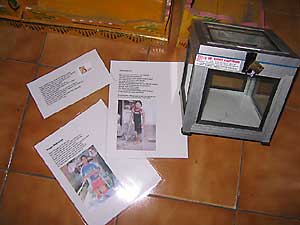
Wayan is a woodworker and will make small wooden objects and jewellery which are attractive in design and price for tourists. Arini paints wooden dolphins. A space has also been set up for children put forward by Marieke de Wit who make goods for sale in therapy time or otherwise. The children do not, however, take part in the savings and investment part; the entire sales proceeds are paid to them direct.
’Meal Project’ forerunner
The second long-term project started in the Semina Restaurant. APA Foundation has been able to add its own menu to the normal menu, offering dishes for the “APA Care Meal”The menu offers five traditional vegetarian dishes that allow the diner to make a small contribution of Rp. 5,000 (= € 0.45) per meal to the foundation's work. The owner has agreed that the dishes are offered for a reasonable price so that the total price, including the Rp. 5,000, is about the same for the customer as similar dishes on the restaurant menu.
This project has two aims. The first is to help finance mainly local projects of APA Foundation and to draw the situation of handicapped people in Bali to the attention of a wider audience, especially tourists. The second aim is that elements serve as a try-out for the "Meal Project" for street children that APA Foundation wants to start in the future. It is a way to find out if diners/tourists are prepared to pay a tiny amount extra for a meal or side-order to support a good cause. This information can be used later when setting up a restaurant in combination with a Meal Project for street children. There will also be an investigation of whether such a restaurant could employ young people with a handicap.
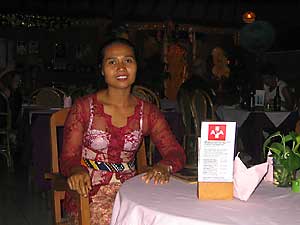
The Semina Restaurant is a "friendly" restaurant with a good kitchen offering a range of traditional meals. If there are enough guests, a dance performance is arranged each evening. The restaurant is fairly busy and is in a street off the main street in Singaraja – Seririt, towards the beach. The owner is not paid for his co-operation, but can benefit from the PR and goodwill of the diners. The retail project and the food/restaurant project are managed by Kadek Wira.
INDIVIDUAL PROJECTS
Some of the assistance to young people with a handicap in the period mid-February to the end of April is discussed below. Applications still under consideration are not listed. There is an agreement with the recipient of each aid supplied which explains that although it is in principle provided for an unlimited period, it can be taken back if it is not being used any more, for example, because a more suitable aid becomes available to the user.
Deni
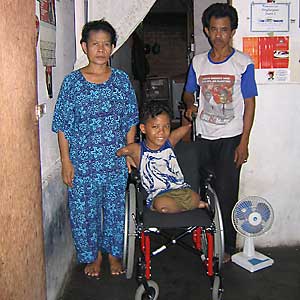
The working visit by APA Foundation to Indonesia this year started in Jakarta, Java. This kept a long-standing promise. The foundation came into contact with Deni in 2003 and he was promised that in due course there would be an attempt to provide him with a suitable wheelchair. The Harting-bank, Revalidatie Techniek, The Hague, made a new child's wheelchair available for him. Deni uses the wheelchair at school. (See 2003: Deni en update)
Ketut Kartawa
Old friends were visited in Bali to see how they were getting on and whether they needed more assistance. One of them is Ketut Kartawa, a polio patient and father of two children who was in a road accident three years ago. There were no funds for a proper diagnosis or treatment. For months he was confined to bed, in pain. Shortly before leaving Bali, staff of APA Foundation had supplied Ketut with a walking frame which allowed him to learn to walk better. Two years later Ketut was visited again. He is walking much better but unfortunately his spine is even more deformed (scoliosis).
After studying x-rays and in consultation with Marieke de Wit and the occupational therapist of APA Foundation, Ketut was measured for a brace to support his left leg and improve his posture. The brace was offered by Marieke de Wit of Stichting High 5 Rehab.
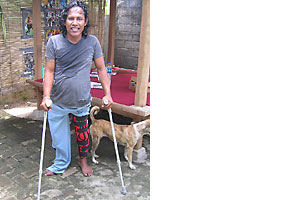
The brace is intended for walking short distances. To avoid overburdening his right leg and back, Ketut has a wheelchair from APA Foundation for longer distances. Ketut was told about workshops and courses at Senang Hati. (see 2003: Kartawa)
Edi
Assistance to Edi is another example of co-operation between APA Foundation and Marieke de Wit. Edi was nominated to the foundation by our mediator Kadek Wira. Edi is 10-year-old boy who is not ADL (day-to-day living) independent and has limited walking ability as a result of cerebral palsy. Originally, Kadek had provided him with a wheelchair from the foundation, but further investigation showed that Edi might be able to walk independently with the right assistance and training. Marieke de Wit was prepared to treat Edi free of charge. Transport twice a week for Edi and his mother is paid by High 5 Rehab. The idea is that Edi first learns to walk with a walking frame; APA Foundation Edi has now supplied a child's walking frame to replace the wheelchair. According to Marieke de Wit, Edi is making good progress.
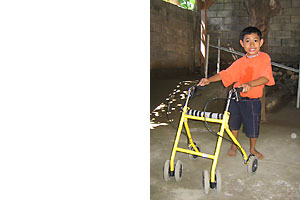
Edi is able to cycle! But his bike was much too small, had no pedals and the saddle was completely worn out. APA Foundation has supplied him with a new bicycle. (See 2005: Edi)
Jojon
Jojon, a 12-year-old boy with progressive muscular dystrophy, is being treated by Marieke de Wit. In a short time he has become wheelchair dependent and he is also losing the strength in his arms and hands. His general physical condition is deteriorating. Marieke de Wit has proposed modifications to his home, in the hope that they can improve his quality of life. Since the death of his father, Jojon has lived with his mother and they have to manage on a very small income. His bedroom, the kamar mandi (toilet and washroom) and kitchen were inaccessible because of a step and because the doors were too narrow for the wheelchair. The layout and interior of the bathroom and his limited strength made it almost impossible for Jojon to use the toilet independently and look after himself.
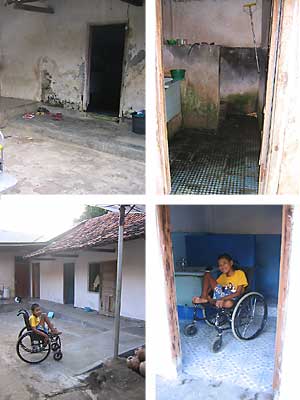
As a result of the modifications to the house, Jojon is no longer dependent on others. He can get to all parts of the house in his wheelchair and manage for himself in the kamar mandi. (See 2005: Jojon)
Arini
Arini is taking part in the retail project. (For more information on how the participants build up experience of managing and investing their income through the "savings system", see "Retail project" in Long-term projects and 2005: Retail project). In the past she had orders for colourful, crocheted hats, but was paid very little. Other people helped her with the crocheting. This source of income stopped, however, as she did not receive any more orders. And this happened when her father has been unable to walk or work for a while following a fall from a palm tree. As a result, the family is even more dependent on the income of the grown-up and younger children. It was agreed after discussions that she should make something else as the market for crocheted hats is currently not very large.
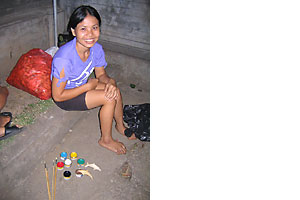
As a try-out, Arini has started decorating wooden dolphins made by local woodworkers and bought for her by APA Foundation. The idea is that Arini will herself decide which articles to make and sell. Arini used home-made crutches to move around. These were uncomfortable to use and not suitable for her height. Arini is used to moving on crutches and is very proficient in this. In view of her physical condition and abilities, these seem to be the most suitable aid for her at the moment. APA Foundation has provided her with a new pair of adjustable crutches. (2002: Arini & Sudike).
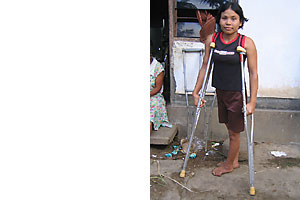
Ogi en Dika
Ogi was supplied with a small wheelchair by APA Foundation. Ogi and his brother Dika both have progressive muscular dystrophy. Previously they had to share one wheelchair, but now the younger boy also has one of his own. Both are being treated by Marieke de Wit who has requested modifications to their home and, after discussion, a recommendation has been made on this.
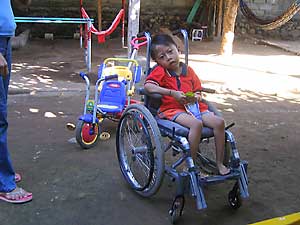
During a home visit, we discovered that the parents, who currently live with the father's parents, are planning to build their own small house, making allowance for the abilities and limitations of their two sons. The parents have asked APA Foundation for advice on modifying the house. As they have little money, they have also asked for a financial contribution to the building costs. When building work started, the staff of APA Foundation had returned to the Netherlands. It was agreed that the plans could be carried out by our mediator and under supervision of Bp. Komang Agung when the kamar mandi is build and fitted out. (See "Activities the Netherlands".) For the time being the two boys have an aid, a urinal, so that they do not always need to be taken to the toilet. (See 2005: Dika & Ogi)
Wayan
Wayan is a young man, 20 years old. He is a polio patient and his right leg is shortened and not properly developed. Wayan is a woodworker and can earn some money in this way. He makes very attractive and detailed wooden decorations for houses and temples. In the past, he got orders from the village and through contacts, but currently there is little work for him. His main question, therefore, was whether the foundation could help him into work. He preferred to live at home or locally. Attempts to get work for him in a woodwork workshop a few kilometres away in Panji have not been successful (there is a workshop In Panji where several handicapped people work.) Consequently, Wayan is participating in the retail project and, sponsored by APA Foundation, is getting the opportunity to build up experience as a small independent businessman. (See 2005: Wayan).
ACTIVITIES IN INDONESIA
Applications
Staff of APA Foundation considered the applications for assistance received while they were away.
They also evaluated the activities undertaken by the mediators. A number of applications have been approved, others have not yet been achieved or have been referred to other bodies. An example of an application requiring further study is a request from SMA in Klungkung (School and home for children with a handicap) for recruiting a needlework teacher . As the type and continuity of lessons are not yet certain, the foundation has decided for the time being not to pay a fee for a teacher whose name is not yet known. The foundation is sticking to the principle that no cash is paid out where the spending is the responsibility of a third party.
An application for mobility aids and hearing aids for a large group of patients in a hospital in Klungkung submitted by our mediator ibu Manoppo is an example of a referral. Many of this group of applicants are outside our target group in terms of age and diagnosis and there were no suitable wheelchairs or mobility aids in store for the people who are in the target group. Ibu Manoppo was referred to Yantin, who works for the Liliane Fonds and Senang Hati, who had a number of wheelchairs available and who could also get hearing aids made through Senang Hati. Sang Ayu, a young woman who in the past had received a sewing machine from APA Foundation, was also referred to Yantin with her application for a motorised tricycle.
Follow-up
Many of the young people with whom there was contact in the past have stayed in touch. This year too, a number of them were visited to see how they were doing. Komang Sumiasih, for example, is no longer following further education. She lives at home and makes a contribution to the family income by making offerings for daily rituals, which her mother sells at the market. Komang Sedana, who in the past had borrowed a pair of crutches because of a leg amputation, has received an artificial leg through an acquaintance. The crutches he no longer uses have been returned to be used by other applicants. Opportunities have been discussed with him about attending various painting and airbrushing courses which can be followed free of charge at Senang Hati. Komang started lessons but had to stop for financial reasons. Sang Ayu was supplied with a sewing machine in 2002 but after further education has gone to Denpasar to learn more needlework skills.
Housing modifications
This year preparations for home modification work have taken up a lot of time. It took a lot of time and effort to find the right contractor, in terms of skill and price, and also to find the right tools and aids for example, in sanitary products. Mainly because a concept also had to be developed for processing home modification applications in the absence of the APA Foundation's staff. Eventually the foundation was satisfied and happy with the alliance with Bp. Komang Agung.
New storage space
New storage space for goods had to be found. After an intensive search, suitable storage was found with a married couple Made Witari who are offering space for a reasonable price. Virtue was made of the necessity; all the rehabilitation aids were inspected and cleaned before being moved.
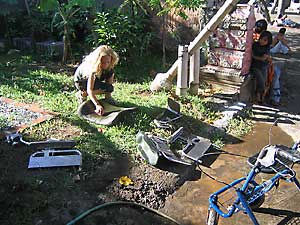
Rehabilitation aids
This year a child ?s wheelchair, 3 pairs of crutches and 3 walking sticks were taken from the Netherlands. All aids, some of which have been stored for a while, are checked and serviced in Indonesia. Wheelchairs are made ready for use, meaning repairing or replacing tyres, cleaned of rust, footrests repaired and welded and cleaned. The child's wheelchair, donated by Tacko Horn, was cleaned up and supplied to Ogi. (See 2005: Dika & Ogi).
Study
There was a study of the circumstances of handicapped young people in terms of poverty and discrimination, with a view to new projects. It focused on issues such as aid and integration of disadvantaged young people in the community and ways of achieving this.
A workshop in Panji , where woodworking is done by a number of handicapped people, was visited in connection with aid to young people with a handicap and helping them follow skills training or earn an income. The Senang Hati foundation , which offers young people with a handicap the opportunity to attend a workshop or course free of charge, was visited. It also organises a range of activities to promote the integration of handicapped people into everyday life. Existing initiatives for selling items made by handicapped people, such as the Kupu Kupu shop/gallery in Ubud, are being examined.
APA Foundation is considering also focusing on assisting streetchildren, in the future. A study was made of the circumstances of children in this target group in Bali. Existing forms of assistance were studied, including a visit to the Lion King home for street children in Singaraja, where 32 children live. They have permanent accommodation, supervision, medical care and education. Frankie and Marinka, a Dutch couple who set up and run the home, give priority to good care. They shared experiences with staff of the foundation and provided a lot of information on the circumstances of street children in and around Singaraja and elsewhere in Bali.
The project started in the Semina Restaurant is intended to raise attention for the activities of APA Foundation and get financial support. It is also forerunner of the "Meal Project" on Foundation APA's agenda to help street children.
Preparing this project took a lot of time and energy in finding a suitable restaurant and the related negotiations.
ACTIVITIES IN THE NETHERLANDS
Maintaining contacts
In the Netherlands, contacts are maintained with bodies which have supplied the foundation with rehabilitation aids in the past. New contacts have also been made with businesses and organisations to get parts such as tyres for wheelchairs.
Long-term projects
A small working group has been set up to organise aid projects for streetchildrenIt includes Mr F. den Burger and Marlijn Lelieveld. Other long-term projects such as the "retail project" and the study fund or disadvantaged young people are being developed and organized.
Support of other aid organizations
APA Foundation has received some rehabilitation aids (2 child's walking frames and a walking trainer) and passed them on to High 5 Rehab.
Since 1998, APA Foundation has mediated in the annual donation to the Liliane Fonds by Bebob Design B.V. Amsterdam, from sales of GISO Lighting. Part of this turnover goes, after discussion with Bebob Design and GISO B.V. to a regular mediator, Sister Merlit, and young handicapped people in need near Delhi, India. (See NL1998 APA-Liliane Fonds-Bebob Design B.V.)
Co-ordination of home modifications
An initial project was the construction of a modified bathroom for Ogi and Dika. The building work was co-ordinated from the Netherlands in September with on-site help from mediator Kadek. The family of Ogi and Dika are building a small house that is suited to the abilities and limitations of the children. The set up and construction of the washroom is being paid by APA Foundation. A drawing was made during the stay of our staff in Bali. The work will be carried out under the supervision of Bp. Agung. The result will be seen on site in due course.
FINANCIAL REPORT
All expenses are initially paid by APA Foundation, but sponsors are being sought for a number of projects. (See the project descriptions). (The descriptions state the costs, but freight costs incurred in the past are not listed as the charge covered a large shipment. Furthermore, not all expenses, such as the start-up costs of participating in the retail project, copying and telephone are listed as they are covered by the staff of the foundation themselves so that the funds of APA Foundation are not drawn on and all the funds can be spent on the projects. A loyal group of people, including the website manager and the translator, also offer support. To date, any costs for website construction and maintenance, printing, etc. have been borne by Bebob Design B.V.)
Donations
From Harting-bank, The Hague, we received a children's wheelchair which is now being used by Deni (see above and 2003: Deni en update. The foundation has also received 2 child's walking frames, a walking trainer with a push-bar and an adjustable child's stool from Harting-bank.
De firma Rolko, Nieuwegein, was kind enough to offer a set of large and small tyres and inner tubes free of charge as replacements for worn-out tyres for a wheelchair in the depot in Bali.
Mevrouw Scholz, of Aerdenhout, gave the foundation a walking frame for adults.
Tabitha nursing home, Amsterdam, donated 3 second-hand wheelchairs.
We would like to take this opportunity to thank everyone!
2004
2004 REPORT
TO MID-2004
Circumstances prevented the visit to Indonesia that normally takes place in the first quarter of each year. One reason was that Casey and Elly Godrie, who always make the visits, had a second child last year. The next visit is now planned for the first quarter of 2005.
Of course, the foundation stayed in contact with its mediators in Bali. Ibu Manoppo submitted a request for a wheelchair for Mahnan, a 24 year-old, who cannot walk. He can temporarily borrow a wheelchair from the hospital. This request is being considered. (See 2004: wheelchair).
ACTIVITIES
Although no visit to Asia is planned for this year and work is going more slowly for a while, the foundation has remained active. Contact was made with RCA te Amsterdam (Revalidatie Centrum Amsterdam) on acquiring rehabilitation aids. Other aids and facilities were offered on several occasions but the foundation decided not to accept them in some cases but to refer them to other organisations. One reason for this was that certain aids cannot easily be deployed as a result of the conditions in which they are to be used. For example, sports wheelchairs with thin tyres are unlikely to last long on rough, stony, potholed roads. And people only benefit when they get help they can used both at home and outside. Nevertheless the foundation is very grateful to everyone for the aids offered and the confidence in our work.
Stichting High 5 Rehab contacted APA Foundation as it will be starting work also helping people with a handicap in Bali.
As noted above, contact was maintained with the mediators on Bali.
DONATIONS
The RCA has promised the foundation some wheelchairs and other facilities which it cannot use any more. They are first being put into good order in the workshop. Many thanks for the commitment and work.
The annual donation by Bebob Design B.V. for 2003 has been received. Again our thanks for this.
A customer of Bebob Design B.V. donated the foundation a child’s wheelchair which has to be propelled independently. Our thanks for this.
2003
2003 REPORT
PROJECTS
Shipment
In March 2003, PZG (Piloten Zonder Grenzen) arranged a free-of-charge shipment of second-hand rehabilitation aids to Indonesia for APA Foundation. It consisted of 6 wheelchairs, including a child's wheelchair, 8 walking frames, a pair of new crutches and a child's commode. The goods were collected in Jakarta by staff of the foundation.
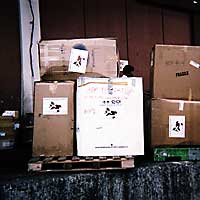
Importing the goods took a great deal of work and for a while looked as if it would cost the foundation a lot of money. After a great deal of effort and assistance by KLM locally, the costs were, in the end, very small. The storage costs for the cargo were halved and, in effect, importation cost nothing. While importation was originally to cost about Rp 12,000,000/ €1500 and storage Rp 1,160,000/ €123, the total costs were reduced to a total of Rp 935,000/ €99. The goods were then taken to Bali by land. We would like to take this opportunity to thank all those who made a contribution for their efforts.
Deni
During the short stay in Jakarta, the foundation came into contact with Deni. Deni is 8 years old and was born with physical deformities. He has not grown, has short arms and only three fingers on his right arm. Deni has just a stump rather than legs. Nevertheless, he can move himself over short distances, such as within his home. He is also very dexterous with his arms. Thanks to donations he goes to a special school three times a week but the school is a long way off and his father takes him by bus. He is then taken the rest of the way on a wagon. During the meeting, his father said that a wheelchair for school would be very welcome in due course. The school has adapted furniture which Deni can use but the other children often come from rich families and many of them have their own wheelchairs. The child's wheelchair in the shipment was unsuitable and in addition could not be used immediately because the front wheels had been damaged in transit. (See Activities in Indonesia). APA Foundation promised to meet this request and to work on transport and seating facilities at school, as Deni now has to be carried longer distances. (See 2003: Deni)
Arini & Sudike
The brother and sister who received a wheelchair from the foundation in 2002 were visited. It became clear during this visit that the wheelchair was being used mainly by the boy, Komang Sudike.
He can get in and out of the wheelchair on his own and can also manoeuvre himself. His family was happy that he had been able to go to the beach about 3 km from the house for the first time without assistance.
His sister, Komang Arini explained that she did not use a wheelchair. She had tried it, but preferred to use crutches. She says she can move more easily and quickly with them and so it was agreed that she would not get a wheelchair. (See 2002: Arini & Sudike)
Komang Sumiasih
The school and home for handicapped children in Klungkung was again visited several times.
Two wheelchairs are in use at the home. Both were in poor condition and had soft tyres at the time of the visit. Staff of the foundation gave both chairs some maintenance. One wheelchair is used all the time by Komang Sumiasih, 16-year-old girl who has had polio. Komang is now "an old friend" who had ADL (day-to-day living) training in the past from the foundation's occupational therapist. She can move short distances independently using a wheelchair and indoors crawls on hands and knees. Komang can move independently in her borrowed wheelchair even though this was made difficult by the soft tyres. No pump was available. The foundation gave Komang a pump that can be used for both wheelchairs at the home, but is and will remain her property.
Komang has been at the home for a couple of years. She can look after herself. She crawls when using the kamar mandi (toilet and washroom), sitting partly on a low wooden bench and partly on the floor and the toilet. The washroom is too small to manoeuvre in a wheelchair and she would need help with this, while she prefers to wash and use the toilet independently. APA Foundation has given her a commode which is now permanently in the kamar mandi and available to all the children who need it.
The 2002/3 school year is Komang's last year at the primary school and will also mean the end of her stay at the home. She has no plans for further education. This has been discussed at length with her and her family. Many opportunities have been considered and solutions thought up, but for the time being Komang sees too many problems in trying to join normal education. Young people with such handicaps are very rarely allowed to follow "normal" schooling and so are a real exception. Even if Komang were offered the opportunity, she does not want to attend an institution for young people with a handicap too far from home. At a later stage, there will be discussions with her to see if she can and wants to continue in education or job training.
At home she can only move around the house and garden by crawling. Outside she is carried to and from the house by her father and on a borrowed motor bike. For the weekends and the time after her primary education, she has been given her own wheelchair by APA Foundation so she can move independently. (See 2003:
In 2002, the head of the home submitted a request for artists' materials for three students who could use the materials to improve their skills in art lessons. The main aim of this, apart from the creative aspect as part of their development, is to get a possible future source of income. Drawing and painting are important parts of the culture on Bali and an income can be earned as a painter or illustrator (including in tourism).
The materials, such as canvas, brushes, paints and sketch pads, were purchased mainly for Komang Puspawan, a polio patient, and Suadarma and Samuel who are both deaf. (See 2004: Artists materials).
Ketut Kartawa
Ketut Kartawa is 35 years old and a polio patient. He is married and has two children. Ketut was able move about without aids, despite his left leg being shortened and deformed. He earned a living as a guitarist in a band until he was involved in an accident in 2002 when he was riding pillion on a moped. He suffered trauma to his back and legs. No clear diagnosis has ever been made. After months in pain in bed, he could hardly move and could only crawl with great difficulty over short distances. An operation, which could only be performed in Jakarta, was beyond Ketut and his family. He could not, of course, earn a living from his sickbed and Ketut's father provided for the family. When Ketut came into contact with APA Foundation he was able to crawl around the house and had started to practice standing and walking a few paces with borrowed crutches. The crutches were, however, much too long and he had to hold them at 45 degrees to stand. The occupational therapist associated with APA Foundation assisted Ketut in the use of crutches and a walking frame.
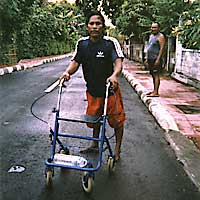
Eventually Ketut opted to (temporarily) use a walking frame (see photo). At the end of 2003, the foundation received a letter from Ketut saying that he was practising every day and that his walking was going well. (See 2003: Kartawa).
FINANCIAL REPORT
All projects which do not yet have a sponsor are funded by APA Foundation. Out-of-pocket expenses for local activities such as travel, telephone, accommodation, etc. are paid by the staff of the foundation themselves so that the funds of APA Foundation are not drawn on and all the funds can be spent on the projects. The same applies to expenses incurred for activities in the Netherlands. A loyal group of people, including the website manager and the translator, also offer support. To date, any costs for website construction and maintenance, printing, etc. have been borne by Bebob Design B.V.
ACTIVITIES
Indonesia
The foundation is very pleased to have recruited another mediator, Kadek Wira.
Kadek has been a good friend of the foundation for many years and has helped in very many ways. We would like to take this opportunity to thank him for his efforts in recent years and his willingness to work as mediator. In his capacity as co-ordinator of the projects of the aid organiser in Sai Baba on Bali he has valuable information and contacts with people needing help, including a list of addresses of young people in the region with a handicap.
He also helped to find suitable storage space near Singaraja. When staff of the foundation are not around, Kadek manages the aids.
All aids were inspected and put into good order before storage. Unfortunately the two front wheels of the child’s wheelchair, already suffering from age, did not survive the journey. No replacements seem to be available locally at the moment.
A school/home (SLB) for handicapped children in Amlapura and a family with two brothers with multiple-handicaps were visited with mediator ibu Manoppo .
A sponsored fish project was set up at the SLB raising mutiara (large ornamental fish) in ponds to be sold to generate income from the school. The SLB requested the APA Foundation to sponsor a chicken project . The idea is to buy and raise chickens and then sell them to earn money for the school.
The foundation has considered this request but has not yet put it on the website as, for animal welfare reasons, APA Foundation does not support raising animals for consumption, with the chance of measures to promote weight increase (such as restricted movement and use of growth hormones). An alternative plan that enjoys everyone's support is being sought.
Ketut en Wayan
Two brothers, Ketut and Wayan, who were visited, live in a small village in Tanah Barat, or Eastern Bali.
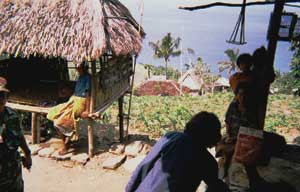
Both have mental and physical handicaps and are also blind. One cannot walk unassisted. The boys live with their family on a small plot of land, with three half-open huts, high on a dusty hillside. The first impression was heartrending. They spend the whole day on the plot, usually sitting or lying on a bench under a shelter. They appeared very dirty. At first sight they seemed very introspective. The second impression was that despite their apparently small world, they enjoy contact with others, in particular a puppy.
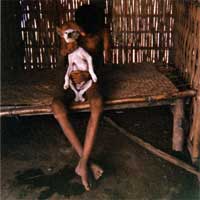
They can make sounds and can communicate in their own way. They are cared for mainly by the family, who they clearly react to. The family are, however, poor and have to work hard to keep their heads above water. Care is a major burden on family life and takes time: time which could be used for work, thinks ibu Manoppo. Her suggestion is to take both brothers to a special home in Jakarta. The foundation thinks that a thorough investigation is needed first. Who has what interests and which are most important? It may be that the boys do not have a problem with looking dirty and value the little contact they have with their surroundings through contact with their family. Is it in their interest to be looked after "better" far from home? And what do the family want? Possible alternative help and guidance are now being investigated.
Ibu Wahyuni
Once again, there was contact with Doctor Ibu Wisnu Wahyuni of Malang. The occupational therapy training in Amsterdam was considered for her questions on aid and information. There was then an exchange of information with Ibu Wahyuni and she was given addresses for occupational therapy training in the Netherlands and in Solo, Java, Indonesia, and of other aid organisations.
ACTIVITIES IN THE NETHERLANDS
Since 1998, APA Foundation has mediated in the annual donation to the Liliane Fonds by Bebob Design B.V., Amsterdam, from sales of GISO Lighting. After discussion, part of this turnover goes to a regular mediator, Sister Merlit, and young handicapped people in need near Delhi, India. (See NL1998 APA-Liliane Fonds-Bebob Design B.V.)
(Zie ook NL1998 APA-Liliane Fonds-Bebob Design B.V)
DONATIONS
Hans Mader, cartoonist, made a very special contribution to supporting the work of the foundation. Mr Mader came into contact with the foundation through Marcel Verbiest of De Cartoonschool, Amsterdam, who had already expressed his sympathy with its aims and wished to make a contribution. He came up with the idea of cartoons that could then be printed on t-shirts and cards, etc. to raise the profile of the foundation. The drawings could also be used for other purposes. He put us in contact with Hans Mader who, after discussion on the message the foundation wants to put over, offered three wonderfully-executed cartoons.
Mr Mader chose to depict animals with a handicap, but which do not feel limited by it and have a full life. APA Foundation is very pleased with this initiative and the result and is developing a plan for the best way to use it (see N101003 Cartoon)
For years, the foundation has received donations from Bebob Design B.V., Amsterdam, which since 2003 has donated a fixed amount. From 2003, the donation has come from a scheme to pay over 5% of the general profit of Bebob Design B.V. and 5% of Bebob Design B.V.'s sales of GISO Lighting, with a small proportion of the latter 5% being donated to the Liliane Fonds. (See N1998 APA-Liliane Fonds-Bebob Design B.V.)
Celine de Lange of Amsterdam donated a pair of adjustable crutches she no longer needed after recovering from a road accident in Vietnam. Our thanks for them. The crutches are in excellent condition and are already in Bali as Celine handed them over to Casey and Elly during a meeting in Thailand, en route to Indonesia.
Remco Kalf discovered the foundation in 2003 via the web and offered new (!) walking aids: 6 walking sticks and 6 pairs of crutches. Our thanks for the gift. The walking aids were collected in 2004. In any event, Arini, the polio patient mentioned above, will be provided with a new pair of crutches as the ones she currently uses are badly in need of replacement.
A Christiene Huizinga gave APA Foundation nursing materials and the foundation will ensure that these materials get a good home.
2002
2002 REPORT
Since its foundation, APA Foundation has operated in Indonesia, in particular in Bali. Up to now, most of the requests selected by the Foundation have been met and a number are still being dealt with.
PROJECTS
Playground
The playground was inspected in April 2002 by Stichting APA. It was in good condition except for a little rust and slight damage. The welding company carried out repairs under guarantee. Repairs of other damage caused by incorrect use, mainly by children with learning difficulties, was paid for by the Foundation.
Sewing machine
In April, the head of the home at Klungkung applied for a sewing machine for Sang Ayu(19). This young woman has been known to APA Foundation for some time. She has polio and walks on two crutches. This year she hopes to finish her secondary education after which she wants to earn a living as a seamstress. She would then like to set up her own sewing workshop. This initiative was received enthusiastically by APA Foundation. Sang Ayu now has a new electric sewing machine and table. (For more information and photos: PROJECT2002; sewing machine)
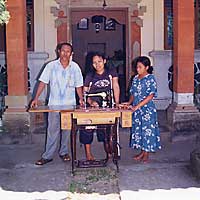 |
Sewing machine for Sang Ayu |
Arini & Sudike
Komang Arini and Komang Sudike, mentioned in the 2001 report, have received a wheelchair. They come from a very poor family. The young woman now works at home making hats. She can move on two old crutches but rarely leaves the kampong where she lives. Her brother has serious deformities of his hips and legs which prevent him standing unaided. He can only move in and around the house by crawling. For the time being, they share the one wheelchair that has been provided. If evaluation shows that the brother and the sister can or want to make greater use of the wheelchair , a second one will be supplied. The young woman can use the wheelchair unaided. Her brother has to be pushed. (For more information and photos: PROJECT2002; Arini & Sudike)
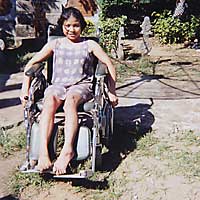 |
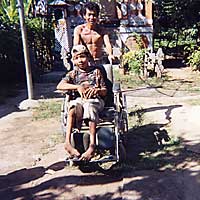 |
| Arini | Sudike |
Crutches
Komang Sedana Putra is a young man of 22. Part of his left leg was amputated two years ago following an accident. Komang has become used to moving around on two crutches but these were bad for his posture. The Foundation has provided him with two new crutches. His family has no transport of its own and he relies mainly on other people for transport, travelling for example on the back of a moped. Komang and the Foundation are looking at options so that he can travel further than his immediate surroundings without help. (For more information and photos: PROJECT2002; Komang Sedana Putra)
Request
On 30 April, the Foundation received a request from Ibu Gunasih, the head of the home attached to the school for handicapped children (SLB) in Klungkung for painting and drawing materials for the children. This request is being dealt with.
Transport
The plan was for four wheelchairs to be transported to Bali last spring with help of PZG (Pilots Without Frontiers). PZG can arrange transport to Jakarta, Java. Unfortunately, APA Foundation was not able to arrange for the goods to be collected in Java for shipment by road to Bali and the shipment has been postponed.
ACTIVITIES
Since April 2002, APA Foundation has had another mediator : Dr. Ibu Siti Sundari Manoppo, a doctor in Klungkung, Bali. Ibu Siti is an enthusiastic and very active woman with a considerable social conscience. She also works for the ÒAvesiena FoundationÕ. She has made a great contribution to setting up APA FoundationÕs network. She had earlier mediated in requests for the Foundation and in 2000 she and her husband, also a doctor, supervised the reconstruction of the kamar mandi (toilet and washroom) at the school for handicapped children in Klungkung. We were, therefore, delighted that Ibu Siti was prepared to become an official mediator of Foundation APA. The Foundation welcomes her warmly and thanks her for her work in previous years.
Useful contacts were again established with various providers of assistance in the social and health sectors. A new contact this year was Dr. Ibu Wisnu Wahyuni, a doctor in Malang, Java. In addition to her hospital work, she runs a home for autistic children and children with mental and physical handicaps. She has also set up an information centre for the children and their families and carers and she is chairman of the ÒAvesiena FoundationÓ. Ibu Wahyuni wants more specific information about this type of care and assistance and to exchange experiences with other helpers and aid bodies. Foundation APA will mediate in this and possibly work with her in the future.
Opportunities were also investigated and addresses collected for mobility and rehabilitation aids in Indonesia.
The Netherlands
Specific information was gathered in the Netherlands about assistance to the handicapped people the Foundation has come into contact with. The Foundation is also collecting addresses in the Netherlands for collecting new or second-hand mobility aids and transport.
The Foundation is very pleased with the contacts with PZG (Pilots Without Frontiers), a charity which arranges the transport of goods. It organises the airfreight of Ôhumanitarian goods with no political natureÕ, for development aid. PZG has undertaken to transport the wheelchairs to Indonesia by air and to make sure that, in principle, there are no transport costs.
DONATIONS
In 2002 Tacko Horn donated the foundation a second-hand wheelchair for children. The wheelchair is foldable and very suitable for a child in the age from three up until seven years old. One anonymous donation was received up to mid-2002.
As in the previous years, Bebob Amsterdam again donated 5% of its sales of Gispen lamps. APA foundation would like to thank her donors.
2001
2001 REPORT
Since its foundation, APA Foundation has operated in Indonesia, in particular in Bali. Up to now, most of the requests selected by the Foundation have been met and a number are still being dealt with.
PROJECTS
Klungkung
Employees of APA Foundation were on Bali for only six weeks in 2001. They were able to take a wheelchair and a pair of crutches with them.
They visited the school for handicapped children in Klungkung and approved the rebuilding of the 'kamar mandi' (toilet and washroom). One kamar mandi is for wheelchair users and children with a limited ability to stand and walk. The other kamar mandi has been renovated. The work was supervised by Dr Manoppo and her husband, both doctors in Klungkung. (For more information and photos: PROJECT2000; Kamar Mandi).
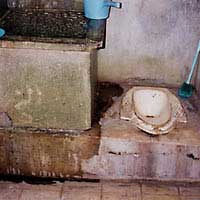 |
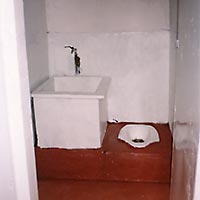 |
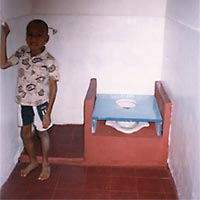 |
Adaptation of the 'kamar mandi' at a school for handicapped children in Klungkung. |
Playground
A playground was built at the school in February 2001. A plan had been drawn up in advance in consultation between the school, the home and employees of the Stichting to ensure the therapeutic value of the apparatus. The apparatus was then constructed and installed by a Balinese welding company. This process was supervised on site by Elly and Casey Godrie.
(for more information and photos: PROJECT2000: playground).
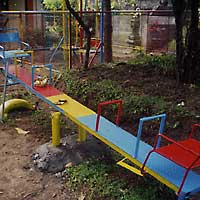 |
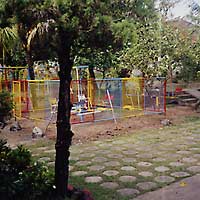 |
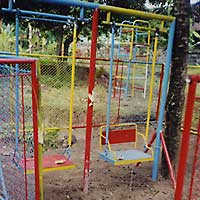 |
The playground at the home. |
ACTIVITIES
Indonesia
Further contacts were made in 2001. There was a visit to a school for deaf and deaf-dumb children in Singaraja and the home attached to it whose immediate requirement is for improvements to the accommodation at the home. In addition, a charity operating in Java and Bali seeking financing for the education of young people from disadvantaged families was also visited. Neither request was in line with the objectives of APA Foundation but it was able to mediate and put the institutions in contact with each other.
Contacts made in 2000 with children with physical disabilities were extended in 2001. Some of them are pupils at the school in Klungkung or live in the attached home. The physical functioning of a number of children was examined by the occupational therapist associated with the Stichting.
Exercises developed in 2000 for Sang Ayu, a girl of 18 at the time and a polio patient, to improve her balance when standing and walking were evaluated in 2001. A number of personal care activities were practised with Komang Komang, then 13 years old and also a polio patient.
The functioning of Komang Arini and Komang Sudike, sister and brother, both polio patients and living at home, was also examined. The girl, then 20 years old, is able to walk short distances on two crutches and can look after herself properly. The boy needs help with most day-to-day activities. He has such deformities on his legs and arms that he can only move with difficulty, by crawling. The family also thinks that he has learning difficulties. Neither have ever been to school. There were consultations with local doctors about help for polio patients on Bali.
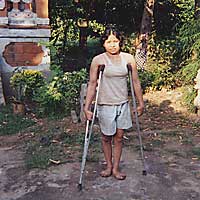 |
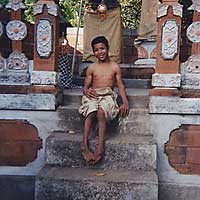 |
| Arini | Sudike |
The Netherlands
Specific information on help for the above polio patients was obtained in Amsterdam from the VU ziekenhuis the rehabilitation centre of the RCA There were also discussions to find out whether The Liliane fonds charity could help these young people.
A benefit evening was organised in the Posthoornkerk, Amsterdam on Valentine's Day, 14 February 2001. The evening, which included a dinner and an auction, was organised by Bebob Design Amsterdam in co-operation with Art Angels and De Bokx Office, all of Amsterdam. The proceeds of € 910,– went to APA Foundation. The Foundation's work was published on the website of Bebob Design Amsterdam.
DONATIONS
Welzorg Amsterdam donated two pairs of new adjustable crutches to APA Foundation for use in Indonesia.
Bebob Design Amsterdam donated 5% of its sales of Gispen lamps as in the previous year. Anonymous donations were also received.
